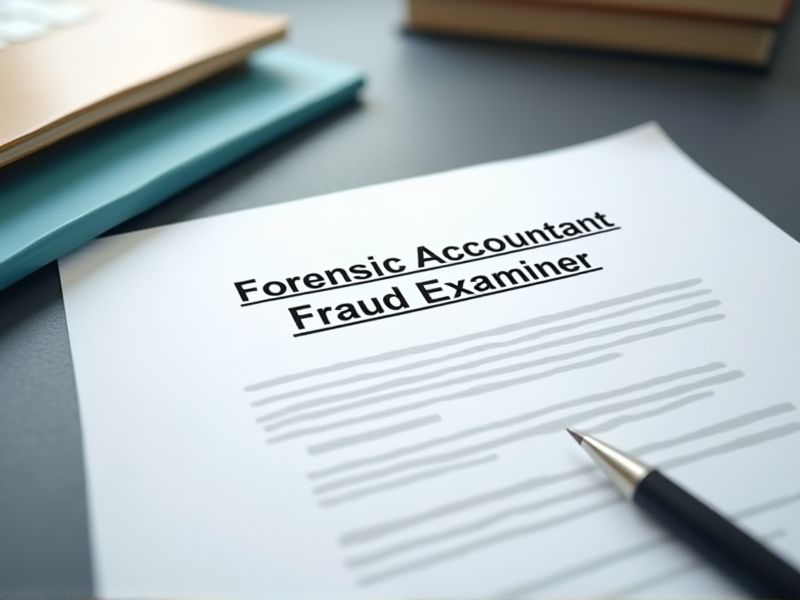
Organizations increasingly face intricate financial fraud schemes, making forensic accountants crucial in uncovering and preventing these crimes. To effectively navigate complex financial records and detect irregularities, fraud examiners require specialized skills validated through recognized certifications. Earning specific credentials not only enhances a professional's credibility but also indicates a commitment to staying current with industry standards and practices. Below are key certifications essential for a Forensic Accountant (Fraud Examiner).
Certified Fraud Examiner (CFE)
Certified Fraud Examiners are needed for forensic accountants to provide specialized knowledge in fraud detection and prevention, which enhances effectiveness in identifying fraudulent activities. Obtaining a CFE designation ensures that the accountant is equipped with up-to-date skills and methodologies specifically tailored for fraud examination. CFEs bring credibility and trust to their investigations, essential for legal proceedings and organizational compliance. The rigorous CFE certification process strengthens analytical competencies for a forensic accountant, making them more adept at uncovering complex fraud schemes.
Certified in Financial Forensics (CFF)
Certified in Financial Forensics (CFF) equips forensic accountants with specialized skills to detect, investigate, and prevent fraud. The certification ensures proficiency in areas such as valuation, litigation support, and bankruptcy, which are critical for fraud examination. With the CFF designation, forensic accountants demonstrate credibility and a commitment to maintaining high professional standards. Employers and clients often prefer professionals with this certification, as it signifies expertise and dedication to ethical practices in financial investigations.
Certified Public Accountant (CPA)
The complexity and rigor of the CPA exam equip forensic accountants with comprehensive accounting skills necessary to detect and investigate fraud. Holding a CPA designation often enhances credibility, which is crucial when presenting findings in legal or regulatory environments. CPA-trained forensic accountants possess an in-depth understanding of financial statements, aiding them in identifying discrepancies that may indicate fraudulent activity. A CPA's adherence to ethical guidelines ensures that forensic accountants maintain objectivity and integrity throughout their investigations.
Chartered Accountant (CA)
Chartered Accountants provide a strong foundation in accounting principles, which is crucial for accurately identifying financial discrepancies in forensic accounting. Their rigorous training enhances their ability to conduct thorough and precise audits that are essential for uncovering fraud. The ethical standards upheld by CAs give credibility and trust when presenting findings in legal proceedings. Their expertise in financial laws and regulations aids in creating effective strategies to detect and prevent fraudulent activities.
Certified Internal Auditor (CIA)
A Certified Internal Auditor (CIA) provides critical skills in risk assessment that enhance a forensic accountant's ability to identify potential fraud areas. The CIA designation signals expertise in evaluating internal controls, essential for detecting and preventing fraudulent activities. With a strong understanding of auditing standards, a CIA-equipped fraud examiner can design more effective investigative strategies. As fraud schemes become more complex, the CIA's structured approach aids in delivering credible, comprehensive financial investigations.
Certified Information Systems Auditor (CISA)
CISA certification equips forensic accountants with a comprehensive understanding of IT systems and controls, essential for uncovering complex fraud schemes. Proficiency in evaluating information systems enhances an accountant's ability to assess vulnerabilities and prevent fraud. The certification's focus on audit processes and risk management complements forensic analysis skills, leading to more accurate detection of financial discrepancies. CISA provides credibility and a standardized knowledge base, essential for professionals tasked with maintaining integrity and trust in financial investigations.
Accredited in Business Valuation (ABV)
Holding an ABV credential reinforces a forensic accountant's expertise in estimating business worth, which is pivotal during fraud evaluations. An accurate business valuation offers critical insights into misrepresented financial statements, aiding in detecting fraudulent activity. The ABV certification enhances credibility and trust, essential for forensic accountants who often present findings in legal settings. Earning this designation also ensures adherence to high ethical and professional standards, thus improving the quality of examinations and investigations.
Certified Forensic Accountant (Cr.FA)
The Certified Forensic Accountant (Cr.FA) designation enhances credibility, as it verifies an accountant's specialized skills in identifying fraud. Complex financial crimes often require an in-depth understanding of financial systems, which a Cr.FA provides through rigorous training. Legal proceedings involving financial disputes benefit from the expert testimony of a certified forensic accountant, leading to clearer interpretations of the evidence. Companies seeking to reduce financial loss and ensure regulatory compliance often rely on Cr.FAs to conduct thorough investigations and implement preventative strategies.
Certified Valuation Analyst (CVA)
Having a Certified Valuation Analyst (CVA) designation equips a forensic accountant with specialized skills in valuing businesses and assets, essential for accurately assessing financial losses in fraud cases. The CVA credential provides credibility and authority in court, where precise valuation is crucial for presenting evidence. Proper business valuation aids in uncovering hidden assets or transactions that may indicate fraudulent activities. Expertise from the CVA designation enhances a forensic accountant's ability to offer comprehensive financial insight and support during investigations and litigation.
Professional Certified Investigator (PCI)
The role of a Professional Certified Investigator (PCI) provides a robust framework for conducting thorough investigations, which directly enhances the accuracy and efficacy of forensic accountants in detecting and analyzing fraudulent activities. Having a PCI certification equips a forensic accountant with advanced investigative techniques, bridging the gap between financial analysis and comprehensive case resolution. The additional expertise from PCI certification can strengthen forensic accountants' capabilities in evidence collection and interpretation, leading to more effective fraud prevention strategies. The collaborative skills gained through PCI training ensure forensic accountants can work more efficiently with law enforcement and legal teams, streamlining the entire investigative process.
Summary
By pursuing certifications such as CFE, CPA, or CIA, you can enhance your credibility and expertise in forensic accounting. This recognition often leads to increased job opportunities and higher earning potential within the field. With these credentials, you are more likely to gain trust from clients and employers, allowing for more significant responsibilities in investigations. Furthermore, you stay updated on industry standards and methodologies, improving your effectiveness in detecting and preventing fraud.
